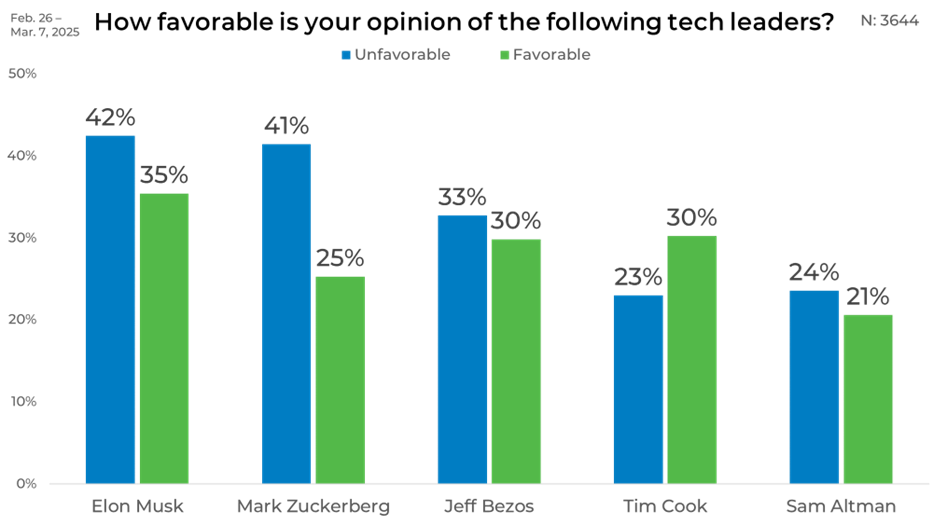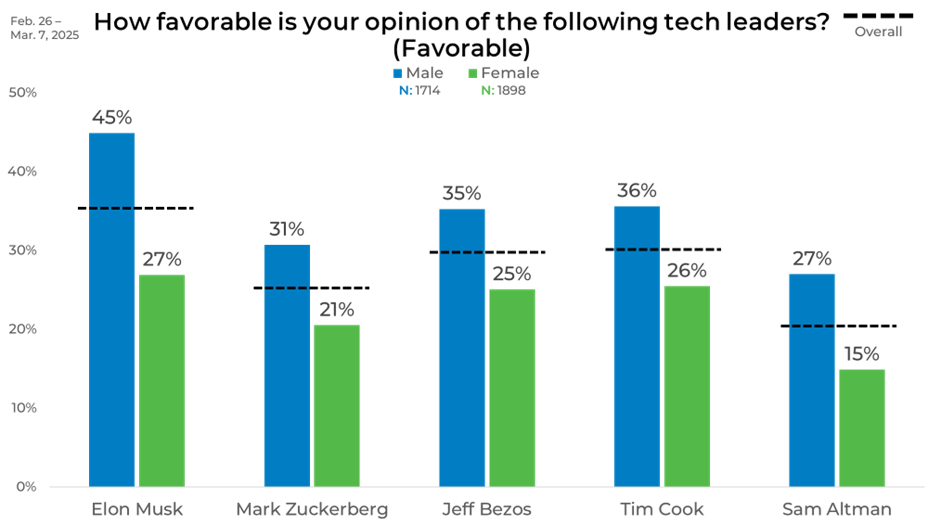
Use It or Lose It: Who’s Actually Using Generative AI?
May 13, 2025
Big Screens, Shrinking Hype? The 2025 Movie Matchup
May 23, 2025What do politicians, celebrities, and tech titans have in common?
They are all very visible to the general public, and opinions on them vary significantly. We wanted to better understand the public’s view on some of the most prominent names in the technology industry. To explore this, respondents rated five influential executives—Elon Musk (Tesla, X), Mark Zuckerberg (Meta), Jeff Bezos (Amazon), Tim Cook (Apple), and Sam Altman (OpenAI) – using a 5-point favorability scale in our latest wave of research-on-research.
Overall
Overall, Elon Musk and Mark Zuckerberg lead in favorability among tech leaders. Musk earns a 35% top-two-box rating and a 42% bottom-two-box score, while Zuckerberg follows with a 25% top-two-box rating and a 41% % bottom-two-box score. Jeff Bezos sits in the middle with a 30% favorability rating and a 33% unfavorability rating, while Tim Cook has a 30% favorability paired with a lower 23% unfavorability rating. Sam Altman, less known to the public, has a 21% favorability rating and 24% unfavorability, highlighting more balanced but modest perceptions overall.

Gender
Gender differences in opinions are striking. Men are significantly more favorable across the board, especially toward Elon Musk, who shows the widest gap at 45% favorability among men versus just 27% among women. Jeff Bezos also sees a sizable difference in favorability with 35% for men compared to 25% for women. Sam Altman and Tim Cook follow with 12-point and 10-point gaps, respectively, reinforcing the consistent pattern of higher male favorability.

Age
Younger adults show more substantial support for most tech figures, but favorability generally declines as age increases. Respondents aged 25-44 consistently rate Musk, Zuckerberg, Bezos, and Cook higher than other age brackets. Musk peaks at 40% among those aged 35-44, while Tim Cook reaches 38% among 25-34-year-olds. Jeff Bezos and Mark Zuckerberg both maintain favorability scores in the low 30s for this age group, but drop by 10 points or more among those 45 and older. Sam Altman follows the same trend, peaking at 30% favorability among 25-34-year-olds but falling to just 12% with those 65 and up.

Income
Income also plays a role in shaping opinion. Higher earners are notably more favorable toward all five leaders, with a clear upward trend in favorability scores as income increases. Elon Musk enjoys a 52% favorability among those making $100,000+, compared to just 24% among those under $20,000—a 28-point gap. Jeff Bezos and Tim Cook also show rising favorability with income, each gaining over 15 points from the lowest to the highest bracket. Sam Altman follows the same pattern, more than doubling his favorability from 14% in the lowest bracket to 37% at the top.

Political Affiliation
Political identity shows the sharpest divides in tech leaders’ favorability. Republicans overwhelmingly favor Elon Musk, with a favorability rating of 62%, compared to just 16% among Democrats—a striking 46-point gap. Jeff Bezos follows with a 21-point difference (44% Republican vs. 23% Democrat), and Mark Zuckerberg shows a 17-point divide (37% vs. 20%). Tim Cook draws more balanced support, with a 9-point difference between Republicans (39%) and Democrats (30%). Sam Altman receives modest favorability across the board, with his favorability rating remaining under 30% for all political groups, peaking at 29% among Republicans.

Ethnicity
Ethnic differences offer additional context to tech titan’s favorability. Tim Cook is viewed most favorably by Asian or South Asian respondents at 38%, while Elon Musk leads among Caucasians at 38%. African American respondents rate Bezos and Cook equally at 32%, with Musk slightly behind at 25%. Altman receives fairly consistent but modest ratings across all ethnic groups.

Panel
When comparing results by different panel sources, opinions diverge even more. Panel P respondents rate all five leaders much higher, with Musk at 58% and Altman at 47%—compared to just 30% and 10% respectively in Panel A. Zuckerberg’s favorability score is 48% in Panel P but only 13% in Panel J. Similarly, Tim Cook reaches 51% favorability in Panel P, more than double his score in Panels A and J. These gaps, often exceeding 30 percentage points, demonstrate how panel composition can significantly influence results.

These results highlight the need to strategically blend panel sources to reduce the biases that can be present in different panels. Click the button to learn more about EMI’s approach.




